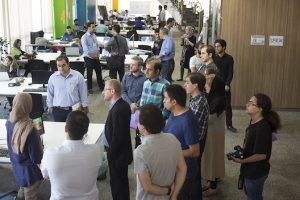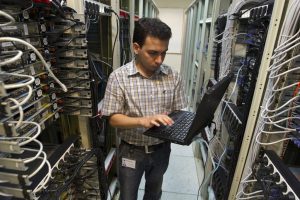Iran’s AI Startups: Startups Driving Change
Table of Contents
-
Introduction
-
The AI Startup Ecosystem in Iran
-
Notable AI Startups in Iran
-
Key Opportunities for AI Startups
-
AI’s Expanding Role in Iran’s Economy
-
Conclusion
-
Key Takeaways
Introduction
Artificial Intelligence (AI) has emerged as a transformative force across global industries, and Iran is no exception. With a growing number of AI-driven startups, Iran’s tech ecosystem is making significant strides despite economic and regulatory challenges. This article explores the landscape of AI startups in Iran, highlighting opportunities, obstacles, and future potential.
The AI Startup Ecosystem in Iran
Iran has seen a surge in AI startups over the past decade, fueled by a combination of strong academic institutions, a talented pool of engineers, and increasing demand for AI solutions across industries. Universities such as Sharif University of Technology and Amirkabir University have been instrumental in producing AI researchers and engineers, many of whom have gone on to establish or contribute to AI-focused companies.
These startups operate in various sectors, including:
- Healthcare: AI-powered medical imaging, diagnostic tools, and telemedicine applications.
- Finance: Fraud detection, credit scoring, and automated trading.
- Retail & E-commerce: Recommendation systems, chatbots, and personalized marketing.
- Manufacturing & Automation: Smart factories, predictive maintenance, and supply chain optimization.
Notable AI Startups in Iran
Artificial Intelligence (AI) is rapidly shaping Iran’s startup ecosystem, with emerging companies leveraging AI technologies to innovate across various industries. Despite economic challenges, Iranian AI startups are proving their resilience by creating solutions tailored to local needs in education, healthcare, agriculture, and smart infrastructure.
AI Startups Leading the Transformation
Several Iranian AI startups are making significant strides in applying AI to real-world problems. Here are five standout companies pioneering AI-driven solutions:
1. LanGeek – AI-Powered Language Learning
LanGeek is an AI-driven language learning platform that personalizes English education for users. By incorporating AI-based language processing, it offers real-life examples, flashcards, and test preparation tools for IELTS and SAT. Available on Android and iOS, LanGeek enhances learning efficiency through adaptive technology, helping students improve their skills based on AI-generated insights.
- Founded: 2020
- Location: Tehran
- Stage: Unfunded
2. Aris – AI in Agriculture
Aris leverages AI to detect plant diseases, providing farmers with instant insights via an app. Users can take photos of crops, and AI technology analyzes the images to identify potential diseases, improving agricultural decision-making. This innovation helps farmers increase crop yields and reduce losses through data-driven insights.
- Founded: 2020
- Location: Tehran
- Stage: Unfunded
3. SinaCare – AI-Driven Healthcare Solutions
SinaCare focuses on AI applications in healthcare, developing solutions that enhance diagnostics and patient management. By utilizing machine learning, SinaCare contributes to improved accuracy in medical assessments, positioning itself as a key player in Iran’s growing digital health sector.
- Founded: 2019
- Location: Tehran
- Stage: Unfunded
4. iCattle – Smart Livestock Monitoring
iCattle combines AI and IoT to enhance livestock management. The company has developed AI-enabled devices that monitor animal health, track location, and predict delivery times for breeders. This technology improves efficiency and reduces risks in the livestock industry, making farming more data-driven.
- Founded: 2016
- Location: Tehran
- Stage: Funding Raised
- Investor: NovinTech
5. Basirtech – AI in Smart Traffic Management
Basirtech applies AI to urban infrastructure, offering cloud-based traffic management solutions. Its technology includes vehicle identification systems, number plate recognition, and AI-based analytics to optimize traffic flow and detect violations. By integrating IoT sensors and AI-driven analytics, Basirtech contributes to smarter city planning.
- Founded: 2006
- Location: Tehran
- Stage: Unfunded
These startups illustrate the diversity of AI applications in Iran and the potential for future innovation in various industries.
Key Opportunities for AI Startups
Untapped Market Potential
With relatively low AI adoption compared to global tech hubs, Iran offers significant growth opportunities for startups that can introduce innovative AI-driven solutions.
Government Support
The Iranian government has initiated policies to encourage AI research and development, offering grants and funding through institutions like the Vice-Presidency for Science and Technology.
Local Talent Pool
Iran’s universities rank among the top in AI and machine learning research, producing a steady stream of skilled professionals who can contribute to AI ventures.
Growing Demand
Companies across various industries are beginning to realize the value of AI in optimizing operations, improving customer experiences, and driving business growth.
Challenges Facing AI Startups in Iran
Regulatory Barriers
Complex regulations, bureaucratic hurdles, and occasional restrictions on emerging technologies can slow down AI innovation and business growth.
Limited Access to International Markets
Due to economic sanctions, Iranian startups face challenges in securing foreign investment, collaborating with international tech firms, and scaling their businesses globally.
Infrastructure Constraints
While Iran has a strong educational foundation in AI, the lack of high-performance computing resources and cloud infrastructure can hinder AI model development and deployment.
Funding Challenges
Venture capital investment in Iran’s startup ecosystem remains limited, making it difficult for AI startups to secure the necessary funding for expansion and research.
AI’s Expanding Role in Iran’s Economy
Beyond individual startups, AI technology in Iran is poised to serve as a critical driver of innovation across various sectors:
- Healthcare: AI-enabled systems are improving diagnostic accuracy, with notable success in detecting diseases such as cutaneous leishmaniasis.
- Education: AI-driven platforms, like LanGeek, are revolutionizing personalized learning and student engagement.
- Agriculture: Startups like Aris and iCattle are integrating AI for crop health monitoring and livestock management.
- Smart Infrastructure: AI-powered traffic management solutions, like those from Basirtech, are enhancing urban mobility.
Despite economic sanctions and resource constraints, Iranian AI startups are demonstrating resilience through lean startup methodologies and adaptive strategies. Their innovations not only address local challenges but also position Iran as a growing hub for AI-driven entrepreneurship.
As AI continues to evolve, these startups are set to play an increasingly influential role in shaping Iran’s technological landscape, ensuring the country remains competitive in the global digital economy.
Conclusion
The journey for AI startups in Iran is marked by both promise and difficulty. While challenges exist, the combination of a strong talent base, emerging market needs, and growing government support provides a solid foundation for AI-driven innovation. By addressing regulatory and financial constraints, Iran’s AI ecosystem can unlock new opportunities and drive economic and technological progress in the years to come.
Key Takeaways
- Iran’s AI ecosystem is growing, driven by strong academic institutions and increasing industry demand.
- There are significant opportunities, including untapped market potential, government support, and a skilled local workforce.
- Challenges remain, such as regulatory hurdles, limited access to international markets, infrastructure limitations, and funding constraints.
- Despite obstacles, Iranian AI startups are innovating, using open-source tools and alternative funding methods.
- Future growth depends on policy reforms, investment in infrastructure, and global collaborations.















Post Comment